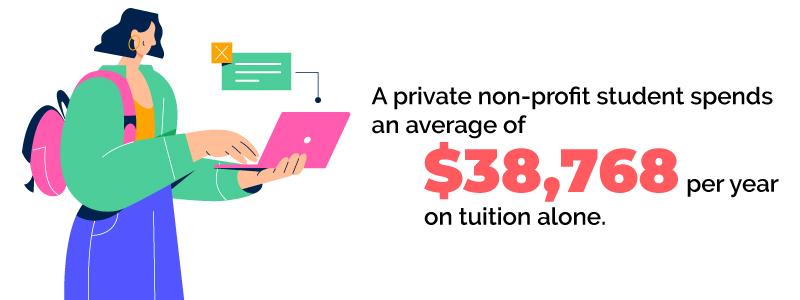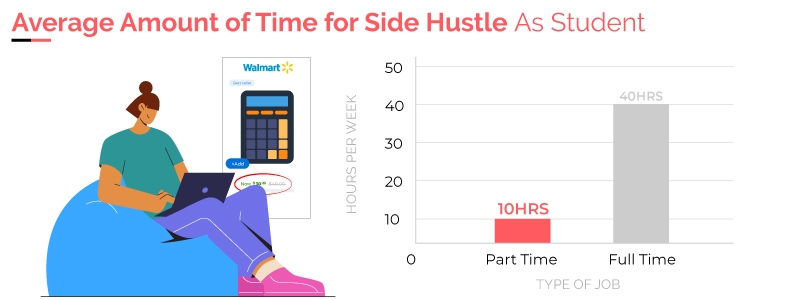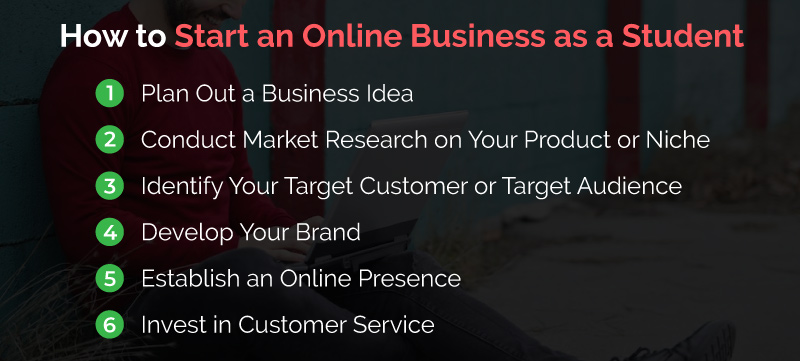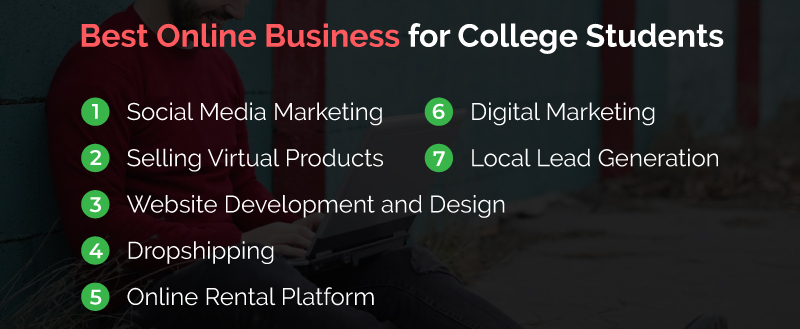
Online business is important for students because it helps with the high costs of going to school. Plus it sets young people up for success early in life. College tuition costs are up by 40% since 2004, and are still expected to rise. The average loan debt amount of a federal student is $37,088. With the average living expense for a single person in America being $38,266, it could take years to pay off the large debt. Students who start and run a successful online business can cover their expenses, avoid debt, and graduate ready to start a fresh new life.
Starting an online business as a student is also beneficial because students meet like-minded people in college. One great example is Mark Zuckerberg, who met his partners while they were studying at Harvard University. Together, the 4 friends started the business which is now Facebook, a company which, in 2023, generated $134.9 billion. Mark Zuckerberg avoided college debt and left school with a business that would set him up for the rest of his life.
A college student can start an online business. In fact, 17% of graduating students already run their own business, and 40% want to follow in their footsteps. 60% say the reason is to be their own bosses instead of working as an employee following graduation. 40%+ say they want to run their own business so they can enjoy life following their passion. Altogether, this desire to start a business in young students is exciting, as owning a business promises multiple benefits.
In this article, we’ll explore 16 reasons online business is important for students. We'll look at real-life examples of successful student business owners. We'll also explore the best business ideas and how students can start their own business.
16 Outstanding Reasons to Get Started with Online Business while in School
1. Earn Money to Cover Expenses

An online business can help you earn money to cover expenses. College is not cheap. A private nonprofit student spends an average of $38,768 per year on tuition alone. Add in expenses like food, housing, and transportation, and that rises to $55,840 per year. Ultimately, the cost of a bachelor’s degree can be more than $500,000.
When students graduate and enter the workforce, it’s not a guarantee that they’ll earn enough to cover their student loan debts. The average entry level salary is $36,075. And with the average living expense in the U.S. at $38,266, newly graduated students can barely cover their expenses, let alone debt. With an online business, even $1,000-$2,000 in residual earnings can greatly help to pay the bills and lessen the student loan debt.
2. Flexible Working Schedule
An online business allows for a flexible working schedule. This is beneficial for a busy student trying to make money around a class schedule. With rising expenses in tuition and the cost of living, around 80% of college students now need to work to support themselves in school. 35% of them work full-time, which is difficult to manage around a busy study schedule. Altogether, it’s getting hard for college students to keep things together and create a healthy work-life balance. The demands of an 8-hour job plus class schedule, coursework, and other activities are taking a toll on the physical and mental health of students.

Meanwhile, running an online business allows for more freedom. Students can work at their own time and pace, dedicating a few hours a day to their business as they see fit. According to Side Hustle Academy, the average amount of time needed to dedicate to a side hustle is 10 hours a week. That's much less than the 40 hours a week required for full-time jobs. And when a business takes off, it can earn up to $50,000 a month or more. This allows student entrepreneurs to hire other people and spend less time running their business online.
3. Work from Anywhere
You can work from anywhere with an online business. One of the great appeals of working online or running an online business is the location freedom. All that’s needed is a stable internet connection, which negates the need to spend money on commuting. The average community college student spends $1,760 per year on transportation. Cutting down on the cost of commute and gas can help students save a considerable amount of money.
The appeal of working online is so high, there are over 35 million digital nomads in the world. Of course, there are details to work on, such as registering a business with local services in the area. But once that is done, the convenience of working from home greatly outweighs the costs.
4. Affordable Startup Costs
Many popular online business models have startup costs that even a broke college student can afford. For example, there’s affiliate marketing. To begin an affiliate marketing business, the only startup cost you’ll need is around $100 for a website and hosting. After that, all you have to do is publish blogs, grow your traffic, and apply for affiliate programs.
Local lead generation is another online business model with the same startup costs. You’ll only need around $100 or less for your website and hosting. From there, you’ll grow your traffic and collect leads, which local businesses need. These local businesses will be happy to pay $500-$3,000 a month to rent your website and get the leads, giving you a steady source of residual income.
In contrast, starting a physical store requires much higher startup costs. You’ll have to get a business permit, pay rent, invest in inventory, and hire W-2 employees. According to the U.S. Small Business Administration, it costs around $3,000 to start a microbusiness. For college students with huge expenses, starting an online business with low startup costs is the most viable option.
5. Fail Early and Learn from Mistakes
If your online business fails while in college, you’ll be better equipped to make the right decisions in the future when it really matters. The hard fact is that 90% of online businesses fail within their first 4 months of operation. People in their 30s or 40s, already steeped in the demands of adult life, may not be able to recover from their first business failure. However, college students are young with their whole lives in front of them. Although a failed business is always a tragedy, there’s more room to grow and start over after college with a list of lessons for the next venture.
The most famous entrepreneurs of all time didn’t make it on their first business venture. Most of them failed terribly, then learned from their mistakes and did better on their next attempt. For example, before Microsoft, Bill Gates started a company called Traf-O-Data with his friends. They built a system that recorded traffic data and sent it to the government. Traf-O-Data eventually failed. But they used the skills they earned and the lessons they learned to build Microsoft a few years later.
6. Finding Partners Can Be Easier
Finding online business partners can be easier in school because you are surrounded by other students every day. Many of them likely have the same professional aspirations. One example is Mark Zuckerberg, who started Facebook at Harvard university with 3 friends. Without the help of these friends, he may not have been able to start the business which now earns more than $100 billion a year in revenue.

Another example is Larry Page, who met Sergey Brin in Stanford. The two were intrigued with the idea of segregating and making sense of the large amount of internet data. They worked together in Page’s dormitory to create a new type of search engine that made more sense of this data. That was where Google, the largest unrivaled search engine in the world, was born. In 2023, Google earned $305 billion in revenue. This made the meeting of Page and Brin in Stanford one of the greatest examples of opportunity springing up from college networking.
7. Bolster Your Resume with Entrepreneurship Experience
Adding entrepreneurship experience to your resume can help you stand out to employers. According to Business.com, businesses aren't sure if they should hire fresh graduates or experienced workers. There are pros and cons to both. While fresh graduates are less expensive and have a more growth-focused mindset, it may also require a lot of resources to train them. On the other hand, while experienced workers need less training, they can be more expensive and more resistant to change.
To counter this dilemma, businesses can hire fresh graduates who already have experience. A graduate who is also a business owner will have the skills, knowledge, and competence to function as a valuable employee in any company.
8. Uncapped Income Potential
Unlike other jobs for students which are typically low paying, an online business has uncapped income potential. One example of a student who earned thousands of dollars in college is Alexis Schroeder. In 2016, in her junior year in college, she was struggling with juggling different part-time jobs to support her in school. She worked as a dog walker, a babysitter, a virtual assistant, and a freelance caregiver in the homes of elderly people. However, she was earning barely enough to make ends meet, while at the same time struggling to balance her time working with her studies.
Around the same time, however, she decided to start blogging. She had just lost 60 pounds, and wanted to tell others her story while helping them achieve the same results. So she began, and in time, her blog took off. In her first year of taking her blog seriously, she earned $30,000 in revenue. The next year, that amount more than doubled to $80,000. She graduated debt-free. This shows that starting a business in college leads to unlimited possibilities and earning potential.
9. No Experience Required
Many entry-level jobs require 2 or more years of experience, but anyone can start their own online business. According to Harvard Business School, 37% of employers cite experience as their biggest hiring factor. What’s more, 47.8% of all civilian jobs require an applicant to have prior work experience. This makes it hard for fresh graduates to compete. Their work experience, such as dog walking and babysitting, doesn't qualify them for entry-level jobs.

On the other hand, there are no requirements for starting an online business. All you need is time, initiative, and a tiny investment of less than $100. If your online business takes off, you can get to 6, 7, or even 8 figures a year, making it unnecessary for you to ever apply for an entry-level job.
10. Ready to Scale after Graduation
If you start your online business while in school, you can be ready to scale it after graduation. Most online businesses like affiliate marketing or local lead generation don't earn anything for around 6 months. After the first dollar comes in, it can take a year or 2 to become fully profitable and sustainable. If you start your online business after graduation, this can spell trouble for you because you'll need to wait for up to 2 years for it to fully support you.
On the other hand, starting a business while in school means you have the time needed to wait for it to grow. If you start during your junior or sophomore year, your business has 2-3 years to take root and become sustainable. After you graduate, with more time on your hands, you’ll be ready to step into the role of full-time CEO, taking your business to even greater heights.
11. Teachers Can Provide Insights and Support
If your teacher has experience with business or the industry of your online business, you can leverage their expertise as their student. Mentoring and support play a huge role in an individual’s success. According to Guider AI, 70% of businesses report better productivity because of mentoring. Insights and support can help a young student struggling with a new business. Mentoring and guidance build confidence for the tough times all businesses face.
If you’re completing a degree in business, things get even better. Most business courses require you to come up with and implement your own business plan before graduation. This means you’ll have the feedback and support of teachers with a background in entrepreneurship. If you work on your online business model with the help of teachers, you’ll enjoy the support many solopreneurs don’t have.
12. Schools Can Provide Resources for Student Entrepreneurs
It’s not uncommon for schools to provide resources that student entrepreneurs can leverage. Universities and colleges are supportive of entrepreneurial students. They show their support through funding programs and competitions. For example, The University of Washington's Foster School of Business hosts several competitions. One of these, the Hollomon Health Innovation Challenge, awards thousands of dollars in prizes. The first place winner gets $15,000, second place gets $10,000, and third place gets $5000. There are also Best Idea prizes worth $2,500 each.
Another example is the Rice Business Plan Competition at Rice University. This is one of the biggest competitions in the world for student startups. The total amount of prize money for the different awards totals more than $1.5 million. All student startups from any country who haven’t raised $250,000 in equity capital or $100,000 in any 12-month period are invited to join. With funding and competitions like these, business minded students have a huge opportunity for success.
13. More Difficult to Take Risks Later in Life
Taking a chance at entrepreneurship when you’re young can be the best time because it typically becomes more difficult to take risks later in life. A study by Harvard University states that most successful startup founders are between the ages 35-45. However, starting a business at this age isn’t easy for everyone. People in their 30s and 40s are usually in the stage of raising a family. This includes housing expenses, school tuition, an increased budget for food and other necessities, and so on.
In comparison, college students have relatively lower expenses. According to the College Board, the average student needs around $2,270 per month for living expenses. Meanwhile, the average expenditure of a middle-aged householder is around $6,081 per month. This large gap in expense makes it beneficial to start an online business and take risks at a younger age and stage in one’s life.
14. Learn Real-World Skills
Modern schooling is typically focused on passive learning. But starting your own online business forces you to learn real world skills you can apply after graduation. A college business course teaches you about business analytics, digital marketing, business administration, customer services, email marketing, and marketing strategy. But running your own online business pushes you to apply and experience them first-hand.
Students who graduate with a plethora of business skills will find it much easier to take on the “real world.” Even if they decide not to continue running their online business, they can still use these skills to apply to jobs that require them. Having hands-on experience will make them invaluable to employers and put them far ahead of their competitors.
15. Form Entrepreneurial Habits Early
Starting an online business as a student allows you to form entrepreneurial habits early. According to Psychology Today, a good habit is built through repetition and reward. This is the process through which long-term habits are formed. However, it’s the same for bad habits. Repeating certain actions continuously roots the bad habit in the system, and the more time passes, the more difficult it is to get rid of.
Like all habits, entrepreneurial habits must be built over time. These include goal setting, time management, continuous learning, financial management, resilience, and networking. These are tough habits to build, and students can’t slip into them instantly after graduation. On the other hand, when they’re cultivated while in school, they’re likely to grow and strengthen throughout life. You need patience, effort, and skill to maintain a strong online presence across multiple digital platforms. That's why building good habits as early as possible is essential.
16. Learn About Yourself and Your Preferences
Starting an online business is an experience that can give you insights about your interests and working preferences. Students are usually required to choose their major at a young age. At this time, their personalities and preferences are still incompletely formed. This is why, according to the National Center for Education Statistics, 80% of students switch to a different major at least one time. Also, only 27% of college graduates work in a field related to their major. It's clear that young people don’t always know early on what they want to do in life.
In comparison, students who start an online business get to experience the “real world” early on. This allows them to find out whether they actually like their major. They can also learn whether they will enjoy a job or business related to their major. Ultimately, this helps save time and money from continuing in a major that doesn't contribute to preferences and goals.
How to Start an Online Business as a Student?

At first, finding out how to start an online business as a student can be daunting. It gets easier when the steps are broken down into smaller pieces. The main things students need to consider are their target market (who will want their products or services), their business idea (whether it’s affiliate marketing, dropshipping, local lead generation, etc.), and how they’re going to reach buyers (through a website, social media, etc.). Once these details are nailed down, it’s easier for the business to take shape and move towards being actualized.
What Are the Best Online Business Ideas for College Students?

The best business ideas for college students are those that can be started with a minimal investment, in the comfort of a dorm room. These include the businesses listed above, and also affiliate marketing or ecommerce businesses. They’re beneficial for students who have just enough time to focus on their venture without allowing their studies to suffer.
Which Online Business Idea Is Best for Students?
The best online business idea for students is local lead generation. That’s because it’s one of the most affordable online businesses out there. Even the most broke college student can afford the initial investment of less than $100 for a website and hosting. What’s more, local lead generation only needs to be set up once, requiring minimal maintenance once it starts running.
To start a local lead generation business, all you have to do is build a website that starts ranking organically and generating local leads. When you have a fair amount of traffic, you can rent the website to a local brand for $500-$3,000 monthly. Of course, the number of websites you build is up to you, so the sky's the limit when it comes to earning potential!
2 Students Who Successfully Started an Online Business
1. Max Reisinger

Max Reisinger started his online clothing brand, Prospectia, when he was only 16 years old. He was savvy in the modern ways of running a business, and used Shopify to set up his online store. At that time, he had just returned from a spell of living in France, and he was feeling lonely and dislocated. However, this didn’t stop him from pursuing his dreams and goals.
When Prospectia became popular, Max decided to start another brand. This time, it was a creative agency called Circle Park, which connected brands with entrepreneurs and artists. He also started up Creative Camp, a venture designed to support upcoming creative talents. All the while, Max flourished at school. He successfully juggled running his businesses, completing his schoolwork, and keeping his grades up. According to him, it’s a rewarding and exciting experience that allows him to develop and enjoy his passions.
2. Jensen Tung

Jensen Tung attended the University of British Columbia, completing his bachelor’s degree in commerce. He’d been an entrepreneur by heart ever since the 5th grade, when he wrote down his dream of one day starting his own company called Warrior Games. During his final year of college, he decided to go his own way and become an entrepreneur.
The first thing Jensen did was start a YouTube channel. Luckily, the Covid-19 lockdown worked in his favor, and one of his videos, a haircut tutorial, got 1.8 million views. He then started an agency that helps with marketing and consulting. Thirdly, he started Storage Hotel, a storage and moving company that makes moving convenient for everyone.
According to Jensen, it’s been a messy, emotional, and thoroughly fulfilling ride. He likes the extra spice in his life that entrepreneurship brings. He says it’s a totally different experience from the beaten path of studying then going on to work for someone else. He encourages other people to do the same, to live life according to their own rules.
How Can Students Balance Academic Learning with Running a Business?
There are ways students can balance academic learning with running a business. Some of these include leveraging tools and technology and not loading too many subjects in a single term. Some of the best tools that help students balance work and studies are Todoist, Nozbe, and Clockify. These tools help list and prioritize tasks, as well as measure the time spent on each one.
Class load also plays a huge impact on the difficulty of balancing academic learning and entrepreneurship. The minimum number of classes required to be considered a full-time college student is 4 (around 12 classes). But those who struggle with juggling running a business and studying can become part-time students. Being a full-time student promises a quicker route towards a higher education degree. However, it's expensive and time-consuming. Being a part-time student is cheaper and allows more free time. This can be an option for college students who are serious about becoming entrepreneurs.
Who Should Start an Online Business While in School?
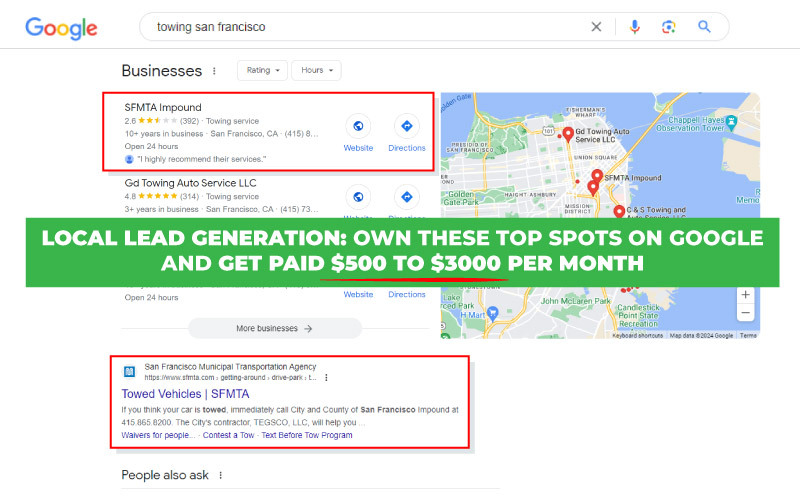
Anyone with aspirations to run their own business should start an online business while in school. It doesn’t matter what their background or experience is, or what degree they’re pursuing. Anyone with resilience, determination, and passion can make money and build a sustainable income as a student.
Of course, the type of online business you choose plays a huge part on whether or not you turn out successful. Don't pick a business that requires huge monetary investment and excessive maintenance. Luckily, there are less-demanding business models that have the potential to earn tens of thousands of dollars.
One of these is local lead generation. This business model is basically self-running - all you need to do is spend a few months setting it up before it starts earning you residual income. With an initial investment of less than $100, you can build a website and employ SEO strategies that collect local leads. Once you have a steady stream of leads coming in, you can rent the website to a local business that would gladly pay you $500-$3,000 a month for it. This is one of the best and most sustainable business models for college students who want to continue studying full-time while earning residual income on the side and having a ready-to-scale business after graduation.



